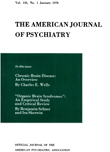Intellectual and neuropsychological functions in young men with heavy and long-term patterns of drug abuse
Abstract
The authors attempted to determine the long-term effects of heavy drug abuse in 87 male prisoners. The sample was divided into the following groups: 1) nondrug users; 2) users of cannabis and hallucinogens; 3) users of cannabis, hallucinogens, and amphetamines; and 4) users of cannabis, hallucinogens, amphetamines, and opiates. Intellectual and neuropsychological tests sensitive to brain dysfunction revealed no intergroup differences. This finding casts some doubt on other reports suggesting that long-term drug abuse results in neuropsychological disorders. However, the authors caution that one should not conclude that no organic changes occurred in their sample.
Access content
To read the fulltext, please use one of the options below to sign in or purchase access.- Personal login
- Institutional Login
- Sign in via OpenAthens
- Register for access
-
Please login/register if you wish to pair your device and check access availability.
Not a subscriber?
PsychiatryOnline subscription options offer access to the DSM-5 library, books, journals, CME, and patient resources. This all-in-one virtual library provides psychiatrists and mental health professionals with key resources for diagnosis, treatment, research, and professional development.
Need more help? PsychiatryOnline Customer Service may be reached by emailing [email protected] or by calling 800-368-5777 (in the U.S.) or 703-907-7322 (outside the U.S.).



